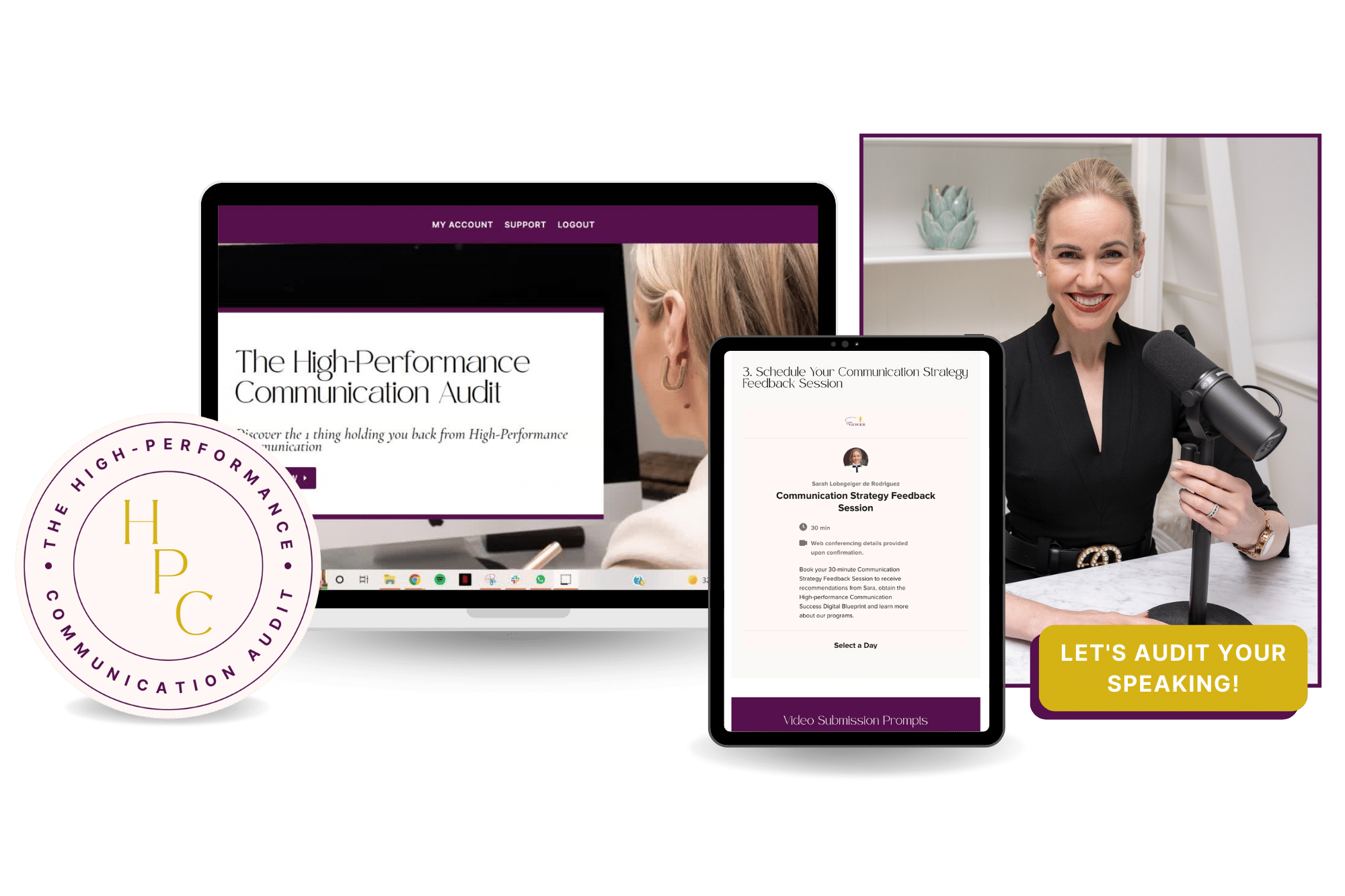Career Communication
7 Management Communication Goals That Give You Energy and Clarity As A Leader
Learn all about management communication goals that every leader needs.

Effective management communication is not secured by virtue of your role. Instead, it’s built on a concrete set of behaviours you intentionally showcase.
Leaders get a unique bird’s eye view of extensive risks in the organisation. Unfortunately, this insight into your organisation’s multiple risks can compete with your cognitive clarity and freshness. When you occupy a leadership position as an executive, CEO or founder, there’s always some process, innovation or conflict that needs your dedicated attention. If you’re finding it hard to feel fresh and clear when communicating, this blog post is for you!
Today we’ll look at 7 management communication goals that will give you energy and clarity as a leader.
Goal #1: Streamline your Speaking Preparation Skills to Reduce Communication Fatigue
Effective decision-making relies on cognitive clarity and freshness.
Once you’re in an executive leadership position, your schedule flexibility becomes more compressed. Back-to-back meetings that require cognitive agility make it essential to develop the tools you need to disseminate information rapidly, ready to deliver a tacit response. As the calendar fills and the pressure increases, the more you’ll benefit from fast and agile communication responses.
Leaders with solid management communication skills can swiftly organise information and synchronise the ideal communication response without obsessing over which approach to take. Unfortunately, it takes several years of experience for most leaders to know what to say and how to respond. Still, some leaders take a shortcut by learning research-based methods with an executive-speaking consultant.
Suppose you develop a precise management communication system that allows you to interpret evidence and plan the sequence and manner of your verbal responses systematically. In that case, you can preserve communication freshness because you’ll lose less time and effort deliberating about what to say at length!
Most managers acquire the advanced verbal skills they need to interact with their team by trial and error, which presents immense risks for their reputation management. One substantial benefit of my executive communication coaching is how it trains you in a management communication system, which quickly prioritises your leadership presence, no matter how busy you are.
Suppose you learn the architecture of logic, especially around moving a conversation partner to action; in that case, your meetings will run smoother, and you’ll see increased buy-in among team members.
Consider you learn a simple plug-and-play speaking format for asserting boundaries with a team member that instantly protects rapport while coding the rules of engagement? In that case, you’ll expend less energy worrying about maintaining a good relationship with that team member because your message will already contain well-crafted rapport-building signals.
A core management communication technique you need in your arsenal is the ability to summarise instructions succinctly without sounding aggressive. Most leaders don’t realise there are researched systems for delivering concise, emotionally intelligent statements to their team.
In the face of pressure, conflicts and risk management, you need to be able to integrate systematic message structures more effectively to form the complex messages you need with speed in the heat of the moment and position your response expertly in a manner that secures your executive presence and spurs team action.

Goal #2: Establish untouchable days or moments in your schedule
Obviously, with increases in your workload, political threats, expanded responsibilities and the feeling that there is no time for all of your KPIs, it’s common to overlook the need for communication growth when so many tasks are vying for your attention. As a result, you can sabotage your leadership impact by getting swept away with solving organisational risks. Cognitive clarity however, builds your leadership presence- protect it!
Management communication coaching will streamline your interactions and reduce the feeling that 25,678 tabs are open on your browser and 500 meetings are in the pipeline.
As the calendar fills and the pressure increases, many leaders struggle to gain optimal focus and instead play a tug of war with crises and mental sharpness.
Don’t let running commentary about leaders in ivory towers stop you from establishing moments in your day where you cool your engines and align yourself closer to the organisation’s vision, values and the most critical thing you can do at that moment.
Head to your calendar or have a discussion with your executive assistant and start to examine your appointment calendar. Ensure that you’re only attending essential meetings and remove any tasks you can delegate to someone else.
If you’re a particularly conscientious leader, pay close attention. Make sure you step out of the way and let your team prove their problem-solving skills. If you’re constantly in the trenches with your team solving their problems, who is accountable for the total view of the battlefield? Take care not to pre-empt risk and problems. Try vanishing from time to time to see what happens. Give your team the chance to solve problems – this is a great way to signal that you trust their expertise. Codependency between employees and leaders is not feasible in the long term because it places too much workload on the leader and may stifle team growth and creativity (Griffith, J. A., et al., 2018). If you notice that your team isn’t able to solve problems in your absence, that’s a red flag for training opportunities or more explicit policies and procedures.
If you’re trailing into long-winded rants when interacting with your team, you’re losing impact because you’re so compressed that your brain is in overdrive. If there’s no way to cull tasks and interactions in your calendar, return to goal #1. Fine-tuning your communication delivery processes to form clear and concise messages that spur action and rapport will make your back-to-back interactions less effortful. When I deliver executive communication coaching to Executives, Founders and CEOs, I train my clients in proven plug-and-play formats. This system allows for clear messages, even if you’re in overdrive.

Goal #3 Pull rank
The role of a leader is to inspire, motivate and lead their team to act with an approach that benefits the organisation’s vision.
If you’re not pulling rank, issuing directives and asserting authority in your role as a leader, you’re not fulfilling your KPIs. But don’t worry; you won’t be the first leader who fails to lead their team. With dropping team engagement and the importance of retaining top talent, many leaders are reluctant to pull rank and assert directives within their organisation.
We already discussed the cult fixation with toxic bosses, not to mention the deep-seated employee hatred of micromanagers. Leaders and managers now need to navigate an incredibly delicate and thorny path. Staff are easily inflamed – understandably! With mounting tensions, leaders can become reticent to support their hierarchical position and instead comprise their executive presence through fighting for likeability.
While it’s noble to want to be liked, aspiring to interact in a highly agreeable manner with your team will reduce your credibility. Executive communication coaching will set up a system for you to engage with your team as a leader using tactful power rather than constant agreeableness and potential compromise.
The most effective leaders activate a variety of leadership behaviours and applying authority to “mobilise people toward a vision” tends to have a predominantly positive impact on the workplace climate (Goleman, 2000)
You inspire, motivate, and guide the organisation’s direction as a leader. Agreeing with all parties to keep the peace when situations go down will not benefit your credibility. There are specific behaviours leaders need to demonstrate, especially in effective change management, that require assertive polish rather than warm, fuzzy and friendly discussions. If you genuinely want to be seen as a transformative leader, cut the friend zone and learn the style of communication that gets elite executives the respect of their team and their industry. Executive communication coaching will refine the delivery of your leadership requests to team members so that you see increased buy-in, trust and rapport without reneging on your not negotiables to keep the peace.
If you’re terrified to call the shots, remember, you can learn to tactfully pull rank where you need to with the social intelligence that benefits team relationships.

Goal #4 Prepare your public speaking expertise so you’re not caught off guard with any world-class presentation opportunity
As your star ascends, the chance of being invited to speak at global summits or world-class events increases. So don’t be that executive I daily meet who neglects to build their public speaking skills so that they’re ready to deliver at an elite level.
There is empirical evidence that you can not get up and wing a stellar presentation at the last minute without a specific set of tools to maximise your communication performance ability (Tur, B., et al., 2021).
World-class public speakers make it look easy. But they’re actually signalling a fixed set of learnt behaviours on stage that invite the listener into their jet stream.
So if you want to shine with charisma and inspire a crowd at your next AGM meeting or media interview, consider dedicating time in your calendar to executive communication coaching sessions that equip you with the practical elements needed for polished, eloquent and admirable presentations. When I prepare my clients for Ted Talks, speaking at the United Nations, on T.V or to the media, I deploy proven methods which
- Increase charisma signalling that inspires your audience
- Increase the visual expression behaviours that result in mesmerising presentations
- Optimise voice tone clarity and projection to result in magnetic delivery
- Train the intonation patterns that create dopamine for the listener
- Build the use of science-based storytelling techniques to captivate the crowd
- Diagnose performance anxiety behaviours and personally engineer strategies for you to override performance pressure so it doesn’t sabotage your stage presence.
- Offer research-based strategies for speech rehearsals that ensure a better presentation on the day and more!
With an executive leadership role, opportunities are likely to open up. Make sure that you’re ready at any moment to present your insights and life work, or it will feel like D-Day if you’ve not invested time to build up your public speaking skills.
Whenever a client contacts me to fast-track their public speaking skills before a massive speaking engagement with a tight deadline, I certainly step in to help. You can avert unnecessary stress and drama if you fine-tune your public speaking skills earlier! There’s no better time than now.
Goal #5 Build up your social intelligence skills, ready to handle any personality, conflict or toxic team member
It’s irresponsible to get to the rank where you’re making decisions that impact an entire organisation, its bottom line, and employees, clients, and shareholders without overriding your speaking reflexes and aiming for a more precise and poised speaking style. Effective management communication is grounded in social intelligence. All leaders need to work on their emotional intelligence. Instead of feeling frustrated about professional interpersonal pressures, feel relieved that there are concrete actions and behaviours you can acquire that conclusively refine your emotional intelligence to handle difficult personalities and team challenges better. Research confirms that “social intelligence is positively associated with problem solving (Rahim, A., et al., 2018) .”
Goal #6 Polish your Charismatic Leadership Style
Ancient mariners couldn’t navigate their fleets without the north star. If you’re a leader, your role is to be the north star for your organisation. It’s your responsibility to signal the organisational principles, values and vision that guide the fleet. If you’re not doing it effectively, who else will?
There are 16 proven charisma tactics that leaders can learn that will rapidly transform your leadership style resulting in profound impacts on how successfully your team will align with the organisation’s vision.
If you feel as dull as a fence, don’t despair. Recent research over the past decade has uncovered that charisma is a trainable skill everyone can improve. So if you’d like to dedicate some time to invest in tactical charisma training, consider enrolling in my High-Performance Communication Audit to get started.
Goal #7 Seek validated methods for your Management Communication Growth
Everyone has an opinion on what constitutes good leadership, but if you want to improve your management communication style, take care where you seek counsel. Unfortunately, there is a gap between expert knowledge about communication research and industry-based training. Just because someone was a leader doesn’t qualify them to provide proven leadership communication tactics. An extensive body of robust research into concrete communication behaviours feeds into effective leadership. I strongly recommend that you check the qualifications of any leadership consultant and avoid opinion-based coaching. Only work with experts with extensive insight into methods with empirical support. Do your research and check this handy guide: How to choose the best communication consultant to develop your speaking skills.
Occupying an executive position is like reaching the summit of Everest only to discover that you’ve got to stay up there in critical conditions and somehow streamline your movements to survive without losing your health and forgetting what actually led you beyond base camp- your core values, principles and raison d’etre.
Which of these 7 goals will make it easier for you to survive at the summit?
✨ Does Your Leadership Communication need Work?
Like all professional skills, high-performance communication can be learnt, especially when it comes to leadership communication.
Meet our High-Performance Communication Audit!

So who is this audit best for?
- Anyone preparing for a high-performance communication activity where the stakes are high like job interviews, public speaking events, or managing teams.
- You if you want to secure your leadership presence in a way that amplifies team motivation, engagement and retention.
- CEOs, executives and emerging leaders who want to finally dedicate increased precision to their communication style to benefit their organisation and team.
If you’d like to get a comprehensive science-based assessment of your professional speaking and gain elite career communication tools, consider enrolling in our High-Performance Communication audit to uncover the turn-key your speaking needs.
Did you enjoy this post? Make sure to subscribe to our YouTube channel to get more content to increase your communication skills!
References
-
Goleman, D. (2000). Leadership That Gets Results. Harvard Business Review.
-
Griffith, J. A., et al. (2018). “Are You Thinking What I’m Thinking?: The Influence of Leader Style, Distance, and Leader–Follower Mental Model Congruence on Creative Performance.” Journal of Leadership & Organizational Studies 25(2): 153-170.
-
Rahim, A., et al. (2018). “A process model of social intelligence and problem-solving style for conflict management.” International Journal of Conflict Management 29(4): 487-499.
-
Tafvelin, S., et al. (2019). “Leading well is a matter of resources: Leader vigour and peer support augments the relationship between transformational leadership and burnout.” Work & Stress 33(2): 156-172.
-
Tur, B., et al. (2021). “Effect of charismatic signaling in social media settings: Evidence from TED and Twitter.” The Leadership Quarterly: 101476.
-
Vullinghs, J. T., et al. (2020). “Ethical and Passive Leadership and Their Joint Relationships with Burnout via Role Clarity and Role Overload.” Journal of Business Ethics 165(4): 719-733.
About the Author
Dr Sarah Lobegeiger de Rodriguez is a Keynote Speaker, Executive Speaking Coach, and Opera Singer who likes to play with words, sounds, and your impact.
Her academic background is in Music Performance, Communication Science and Speech & Language Pathology. She assists executive communication clients all over the world as a communication consultant with strong expertise in CEO, Founder and Entrepreneur communication strategies.
Connect with Sarah on LinkedIn.
© CADENZA
Level 14, 380 St Kilda Road, Melbourne, 3004
Privacy Policy
Terms & Conditions
Position Statement on Racism

